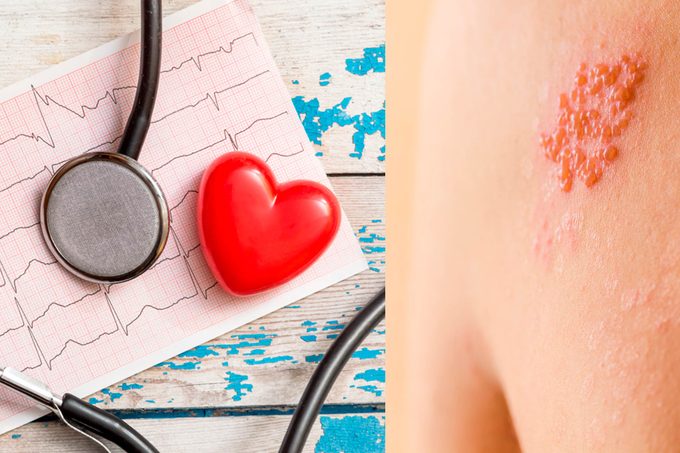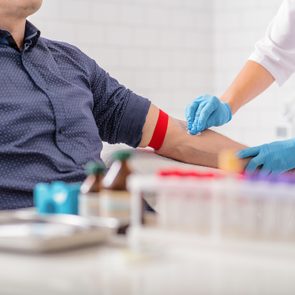How Shingles Can Increase Your Risk of Heart Attack and Stroke
Updated: Jun. 24, 2021
A shingles outbreak can be bad news for your heart.
 You feel so lousy that you suspect the flu, except you don’t have all the symptoms and it’s not flu season. And then there’s that unmistakable rash—an ugly strip of red, pimply-looking blisters just below your rib cage that hurts like crazy. You could try identifying that rash, but it sounds like you could have shingles, and the news just got worse: A shingles outbreak may mean you’re at a higher risk for heart attack and stroke, according to a 2017 study in the Journal of the American College of Cardiology.
You feel so lousy that you suspect the flu, except you don’t have all the symptoms and it’s not flu season. And then there’s that unmistakable rash—an ugly strip of red, pimply-looking blisters just below your rib cage that hurts like crazy. You could try identifying that rash, but it sounds like you could have shingles, and the news just got worse: A shingles outbreak may mean you’re at a higher risk for heart attack and stroke, according to a 2017 study in the Journal of the American College of Cardiology.
Shingles is caused by the varicella-zoster virus (VZV), the same germ that causes chickenpox. Once you’ve had chickenpox, the virus remains dormant in your body and can reactivate years later, causing pain and blisters.
Shingles is common enough that about one in every three people in the United States will develop the painful rash at some point in their lifetime, according to the Centers for Disease Control and Prevention (CDC). Your risk of getting shingles increases after the age of 50, or any time your immune system is compromised.
In addition, it appears that women are more prone to the condition than men, according to the South Korean researchers behind the study. (There are two shingles vaccines available, and health experts recommend that healthy people get one starting at age 50.)
Sifting through data on 519,880 patients registered with the National Health Insurance Services, the researchers found 23,233 cases of shingles. After comparing those cases to shingles-free patients, they discovered that a bout of shingles was linked to a 59 percent increased risk of heart attack and 35 percent higher risk of stroke.
Overall there were 1.34 strokes or heart attacks per 1,000 people with shingles per year, compared with less than one (0.80) stroke or heart attack per 1,000 shingles-free people per year. The risk was higher in the first year after the onset of shingles, and then decreased over time.
Shingles and heart attack risk factors
The researchers found that notably, patients with shingles also tended to have more of the general risk factors for heart attack and stroke, such as old age, high blood pressure, diabetes, and high cholesterol—meaning their health status could have made them more susceptible to a shingles outbreak. On the other hand, they also were less likely to smoke, more likely to exercise, had a lower alcohol intake, and tended to be part of a higher socioeconomic class than the shingles-free people in the study. Interestingly, among those who had shingles, the risk of having a heart attack or stroke was most pronounced in people under 40 years of age, when typically the under-40 crowd is generally at lower risk for heart disease in the general population.
Clearly, the findings require further study, Sung-Han Kim, MD, PhD, a physician in the department of infectious diseases at Asian Medical Center in Seoul and one of the study authors, said in an American College of Cardiology press release. However, the newer findings build on prior research that also linked shingles and heart disease risk, so, “it is important that physicians treating these patients make them aware of their increased risk,” says Dr. Kim.
Whether you’ve had shingles or not, here are some key ways to reduce your risk of heart disease and stroke.





















